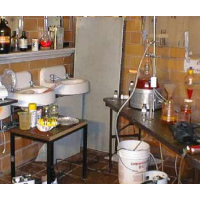Kentucky Counties that Ban Alcohol Sales See Increase in Meth Labs
 Meth lab (AP photo)
Meth lab (AP photo)
Kentucky counties that have banned the sale of alcohol may have found themselves to be victims of the law of unintended consequences—they might have inadvertently encouraged the establishment of meth labs.
Researchers from the University of Louisville studied counties that prohibit alcohol sales (or “dry” counties), those that allow it in certain cities (“moist”) and those that don’t restrict it at all (“wet”). What Jose M. Fernandez, Stephan Gohmann and Joshua C. Pinkston found was dry counties had higher rates of police breaking up meth labs and higher rates of meth crimes overall.
The difference between dry and wet counties was such that the researchers concluded: “If all counties were to become wet, the total number of meth lab seizures in Kentucky would decline by about 25 percent.”
Meth lab seizures in dry jurisdictions were nearly 4 per 100,000 people, while the rate in wet counties was just over 2 per 100,000. Similarly, the rate for meth-related incidents in dry counties was 80 per 100,000 people, while the rate in wet counties was half that (40 per 100,000).
So what’s the correlation? “Our results add support to the idea that prohibiting the sale of alcohol flattens the punishment gradient, lowering the relative cost of participating in the market for illegal drugs,” according to the study. In other words, once you get used to breaking the law by smuggling booze into a dry county, it’s a short step to getting into the meth business.
-Noel Brinkerhoff, Steve Straehley
To Learn More:
Breaking Bad: Are Meth Labs Justified in Dry Counties? (by Jose M. Fernandez, Stephan Gohmann and Joshua C. Pinkston, University of Louisville)
These Places Banned Booze. Now They’re Dealing with Something Far Worse (by Christopher Ingraham, Washington Post)
- Top Stories
- Unusual News
- Where is the Money Going?
- Controversies
- U.S. and the World
- Appointments and Resignations
- Latest News
- Musk and Trump Fire Members of Congress
- Trump Calls for Violent Street Demonstrations Against Himself
- Trump Changes Name of Republican Party
- The 2024 Election By the Numbers
- Bashar al-Assad—The Fall of a Rabid AntiSemite






Comments